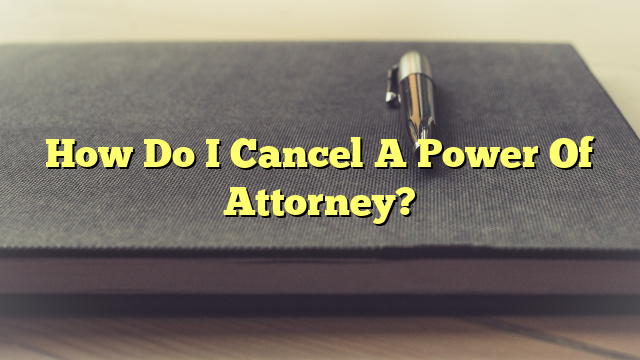Table of Contents
- How to Revoke a Power of Attorney
- The Legal Effect of Revoking Power of Attorney
- Revoking Power of Attorney in a Specific Situation
- Questions to Ask Before Revoking a Power of Attorney
How to Revoke a Power of Attorney
A power of attorney (POA) is a legal document that grants another person, known as an agent or attorney-in-fact, the authority to act on your behalf. The agent is able to make decisions and take action, such as signing documents, on your behalf. A power of attorney can be revoked at any time, provided the grantor (the person granting the power of attorney) has the capacity to do so.
In order to revoke a power of attorney, you must take certain steps. First and foremost, you should create a document that states your intention to revoke the power of attorney. In the document, you should include the following information:
- The date on which you are revoking the power of attorney
- Your name, address and contact information
- The name and contact information of the person to whom you granted the power of attorney
- A statement that you are revoking the power of attorney
- Your signature
Once you have created the document, you must provide a copy of it to the agent and any third parties to whom the agent has given notice of the power of attorney. You must also take steps to revoke the power of attorney in any other manner required by law. For example, you may need to file the document with the court or notify certain governmental agencies.
The Legal Effect of Revoking Power of Attorney
When you revoke a power of attorney, it has the same effect as if the power of attorney had never been granted. This means that any actions taken by the agent after the power of attorney was revoked are not legally binding. However, any actions taken by the agent before the power of attorney was revoked are still valid and binding.
It is important to note that revoking a power of attorney does not automatically revoke any other documents that you have signed. For example, if you have granted the agent the authority to sign contracts on your behalf, those contracts are still binding even after you revoke the power of attorney.
Revoking Power of Attorney in a Specific Situation
In some cases, you may need to revoke a power of attorney in a specific situation. For example, you may need to revoke the power of attorney so that the agent can no longer take action in a particular matter. In this case, you should create a separate document that states your intent to revoke the power of attorney in the specified situation. You should also provide a copy of this document to the agent and any third parties who have notice of the power of attorney.
Questions to Ask Before Revoking a Power of Attorney
Before revoking a power of attorney, it is important to consider the consequences. You should ask yourself the following questions:
- What are the potential consequences of revoking the power of attorney?
- Do I have any other documents that grant the agent authority to act on my behalf?
- What steps do I need to take to revoke the power of attorney in my state?
- Do I need to provide notice to any third parties who have notice of the power of attorney?
Once you have answered these questions, you can decide whether or not revoking the power of attorney is in your best interests.

